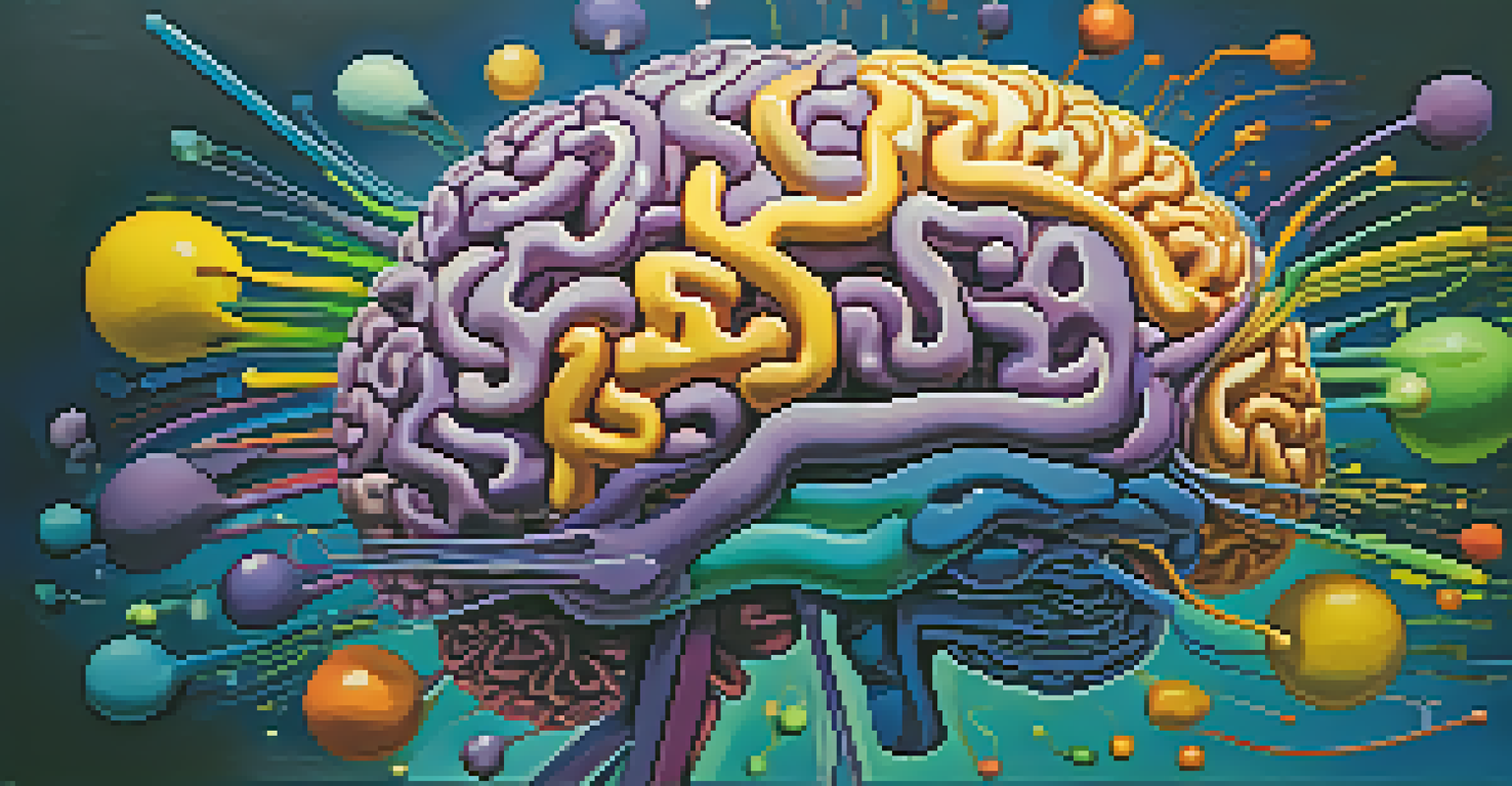Dopaminergic Mechanisms in Hallucinogen-Induced Perception

Understanding Dopamine's Role in the Brain
Dopamine is a neurotransmitter that plays a crucial role in the brain's reward system and regulates feelings of pleasure and motivation. It is often associated with the brain's ability to process rewards, but its influence extends into various cognitive functions, including perception. Understanding dopamine's fundamental role helps us appreciate how it interacts with other systems, especially during altered states of consciousness.
Dopamine is the reward molecule, the chemical that drives us to seek pleasure and avoid pain.
When we consume hallucinogens, such as LSD or psilocybin, they can significantly alter the dopamine levels in the brain. These substances can increase dopamine transmission, which may lead to heightened sensory experiences and altered perceptions of reality. This alteration isn't just a side effect; it is a core component of how hallucinogens affect the brain's functioning.
By studying the mechanisms through which dopamine interacts with hallucinogens, researchers can uncover insights into both the therapeutic potential of these substances and the nature of human perception itself. This opens up fascinating discussions about the boundaries of consciousness and how our brains construct our reality.
The Interaction Between Dopamine and Hallucinogens
Hallucinogens primarily work by affecting serotonin receptors, but they also have a notable impact on the dopaminergic system. When someone ingests these substances, the surge of serotonin can lead to increased dopamine release, creating a complex interplay between the two neurotransmitters. This interaction is crucial for understanding the perception of hallucinations and altered states.

For example, while serotonin might enhance sensory input, dopamine can amplify the emotional and motivational aspects of these experiences. This means that a person may not only see vivid colors or hear unique sounds, but they might also feel a sense of euphoria or heightened engagement with their surroundings. This emotional response can make the experience profoundly impactful, shaping how individuals remember and integrate their hallucinogenic experiences.
Dopamine's Role in Reward and Perception
Dopamine is crucial for regulating pleasure and motivation, influencing how we perceive reality, especially under altered states.
Research in this area is still evolving, but it's clear that the dopaminergic mechanisms help explain the depth and richness of hallucinogenic experiences. By dissecting this relationship, scientists are paving the way for potential therapeutic applications in mental health.
Perception Alteration During Hallucinogenic Experiences
When people use hallucinogens, their perception of reality can shift dramatically. This alteration can manifest in various ways, such as changes in visual or auditory experiences, often described as enhanced or distorted. Understanding the dopaminergic mechanisms at play can provide insight into why these changes occur and how they are perceived by the user.
Hallucinogens can expand our understanding of consciousness and reveal the latent potential of the human mind.
The brain's visual and auditory processing centers become more active under the influence of hallucinogens, often due to increased dopamine levels. This heightened activity can explain why users report seeing patterns, colors, or sounds that aren't present in their normal state of consciousness. The fusion of sensory input can create profound experiences that challenge our conventional understanding of perception.
These altered states of perception are not merely illusions; they can offer unique insights into the workings of the mind. As we continue to explore these experiences, the role of dopamine becomes clearer, revealing its significance in shaping our understanding of reality while under the influence of hallucinogens.
The Therapeutic Potential of Hallucinogens
Recent research has begun to explore the therapeutic potential of hallucinogens in treating various mental health conditions. Conditions such as depression, PTSD, and anxiety have shown promising responses to treatments that incorporate hallucinogenic substances. Understanding the dopaminergic mechanisms involved can help researchers refine these approaches for better outcomes.
The increase in dopamine during hallucinogenic experiences can lead to significant shifts in mood and perspective, which may aid in breaking the cycles of negative thought patterns. For instance, patients may find new meanings and insights about their experiences, allowing them to reevaluate past traumas or distressing thoughts. This therapeutic angle highlights the brain's remarkable capacity for change.
Hallucinogens Affect Dopamine Levels
The use of hallucinogens increases dopamine transmission, enhancing sensory experiences and emotional responses during hallucinations.
As more studies emerge, the potential to harness these effects for therapeutic purposes becomes increasingly plausible. By focusing on the dopaminergic pathways, researchers can develop targeted interventions that maximize the benefits of hallucinogens while minimizing risks.
Challenges in Researching Hallucinogens
Despite the growing interest in hallucinogens and their effects on the dopaminergic system, research in this field faces numerous challenges. Legal restrictions and societal stigma have historically limited studies on these substances, making it difficult to conduct comprehensive research. However, as perceptions shift, the opportunity to explore these substances scientifically is expanding.
Another challenge lies in the subjective nature of hallucinogenic experiences. Everyone reacts differently to these substances, influenced by factors such as individual biology, mindset, and environment. This variability complicates the understanding of how dopamine specifically contributes to altered perceptions across different individuals.
Nonetheless, researchers are finding ways to navigate these challenges. By employing advanced neuroimaging techniques and controlled studies, they are uncovering valuable insights into the dopaminergic mechanisms that underlie hallucinogen-induced perception.
Future Directions in Hallucinogen Research
As the field of hallucinogen research continues to grow, future studies will likely focus on refining our understanding of how dopamine affects perception. Researchers are interested in identifying specific dopamine pathways that are activated during hallucinogenic experiences, which could lead to more targeted therapeutic approaches. This could revolutionize how we treat mental health conditions.
Additionally, there is a push to explore the long-term effects of hallucinogen use on the brain's dopaminergic system. Understanding these effects can provide insights into potential risks and benefits, helping to shape safe practices for their therapeutic use. Longitudinal studies could reveal how these substances might alter dopamine levels over time.
Therapeutic Potential of Hallucinogens
Research indicates that hallucinogens can help treat mental health conditions by leveraging dopamine's effects on mood and perception.
By embracing a multidisciplinary approach that combines neuroscience, psychology, and pharmacology, the future of hallucinogen research holds great promise. This exploration may not only deepen our understanding of altered states of perception but also improve mental health treatment outcomes.
Conclusion: The Intriguing Connection of Dopamine and Hallucinations
The exploration of dopaminergic mechanisms in hallucinogen-induced perception opens a fascinating window into the workings of the human mind. From enhancing sensory experiences to altering emotional states, dopamine plays a critical role in shaping how we perceive reality under the influence of these substances. This connection highlights the complexity of our brain's chemistry and its profound impact on our experiences.
As research continues to unfold, the therapeutic potential of hallucinogens becomes more evident. By understanding the interplay between dopamine and hallucinogens, we can unlock new avenues for treating mental health conditions and enhancing human consciousness. The integration of these findings into therapeutic contexts could lead to groundbreaking changes in how we approach mental health care.

In summary, the link between dopamine and hallucinogens not only expands our knowledge of brain function but also encourages us to rethink our perceptions of reality. As we delve deeper into this captivating subject, we may find that the boundaries of consciousness are not as rigid as we once believed.